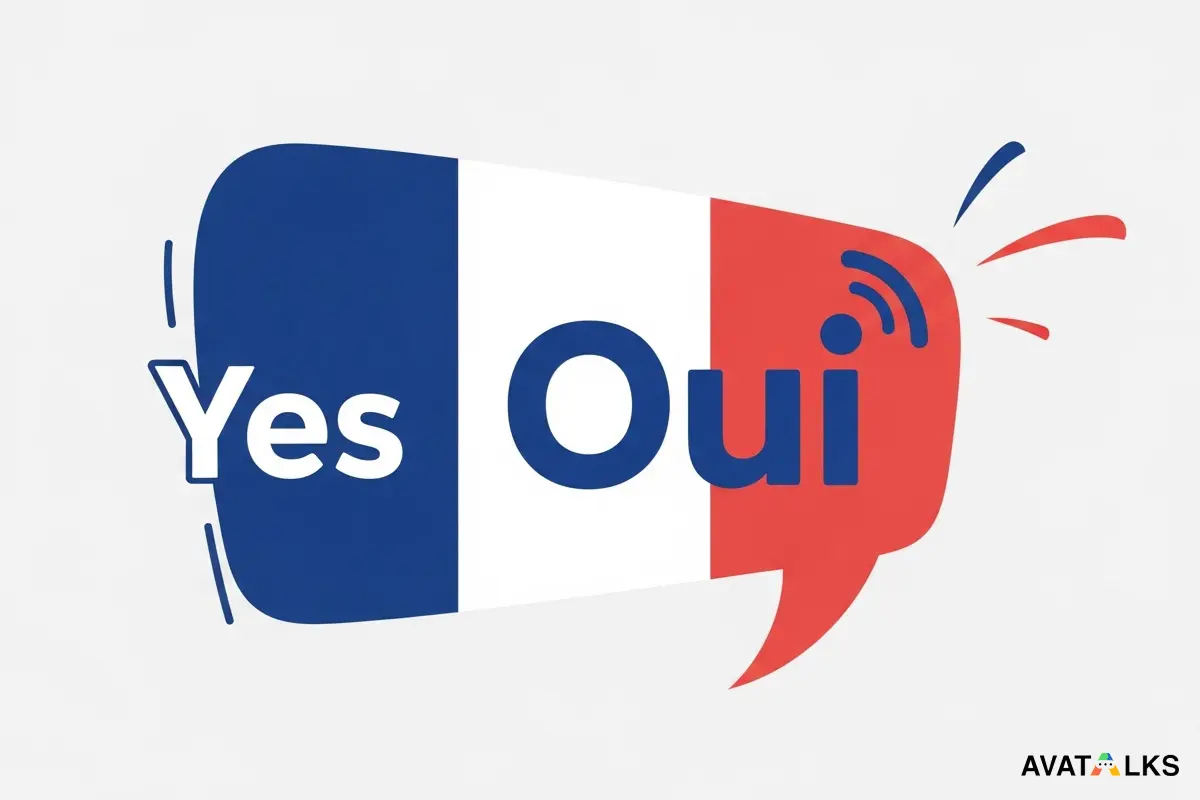
If you’re learning French, one of the first words you need is “yes in French.”
The most common answer is oui, but French speakers use many different words depending on tone, formality, and context.
Below are 10 common ways to say yes in French, with pronunciation and real usage tips.
Note: you might want to use our Avatalks’s interactive 3D tool to Master French alphabet and pronunciation.
1. Oui — The Standard Yes
- Meaning: Yes
- Pronunciation: wee (/wi/)
- Use: Neutral, polite, works everywhere
Example:
Tu veux un café ? — Oui, merci.
(Do you want a coffee? — Yes, thank you.)
2. Ouais — Casual “Yeah”
- Meaning: Yeah
- Pronunciation: weh
- Use: Informal, used with friends
Example:
On sort ce soir ? — Ouais.
(Going out tonight? — Yeah.)
3. Ouaip — Playful “Yep”
- Meaning: Yep
- Pronunciation: wehp
- Use: Very casual, friendly tone
Example:
T’as compris ? — Ouaip.
(Did you understand? — Yep.)
4. Si — The Contradictory Yes
- Meaning: Yes (used to contradict a negative)
- Pronunciation: see
- Use: Only after negative questions
Example:
Tu n’aimes pas le fromage ? — Si !
(You don’t like cheese? — Yes, I do!)
5. Bien sûr — “Of Course”
- Meaning: Of course
- Pronunciation: byen syur
- Use: Polite, confident agreement
Example:
Je peux entrer ? — Bien sûr.
(Can I come in? — Of course.)
6. D’accord — “OK / Agreed”
- Meaning: OK, agreed
- Pronunciation: da-kor
- Use: Neutral agreement
Example:
On se voit à 8h ? — D’accord.
(See you at 8? — OK.)
7. C’est bon — “All Good”
- Meaning: That’s fine / OK
- Pronunciation: say bon
- Use: Everyday situations
Example:
On se retrouve ici ? — C’est bon.
(Shall we meet here? — That works.)
8. Évidemment — “Obviously”
- Meaning: Obviously
- Pronunciation: eh-vee-dah-mahn
- Use: Confident or slightly emphatic yes
Example:
Tu viens avec nous ? — Évidemment.
(Are you coming with us? — Obviously.)
9. Avec plaisir — “With Pleasure”
- Meaning: Gladly / With pleasure
- Pronunciation: ah-vek pleh-zeer
- Use: Polite, friendly acceptance
Example:
Tu veux nous aider ? — Avec plaisir.
(Do you want to help us? — Gladly.)
10. Carrément — “Definitely”
- Meaning: Definitely
- Pronunciation: ka-ray-mahn
- Use: Informal, enthusiastic yes
Example:
Ce film est génial ! — Carrément !
(This movie is great! — Totally!)
Quick Summary: Yes in French
| French | Meaning | Tone |
|---|---|---|
| Oui | Yes | Neutral |
| Ouais | Yeah | Casual |
| Ouaip | Yep | Very casual |
| Si | Yes (after negatives) | Corrective |
| Bien sûr | Of course | Polite |
| D’accord | OK | Neutral |
| C’est bon | All good | Casual |
| Évidemment | Obviously | Confident |
| Avec plaisir | Gladly | Polite |
| Carrément | Definitely | Informal |
Final Tip
To sound natural in French, don’t rely on only “oui.”
Match your “yes” to the situation:
- Formal: oui, bien sûr, avec plaisir
- Casual: ouais, carrément, c’est bon
- Negative question: always use si
Mastering these variations will make your French sound natural and confident.